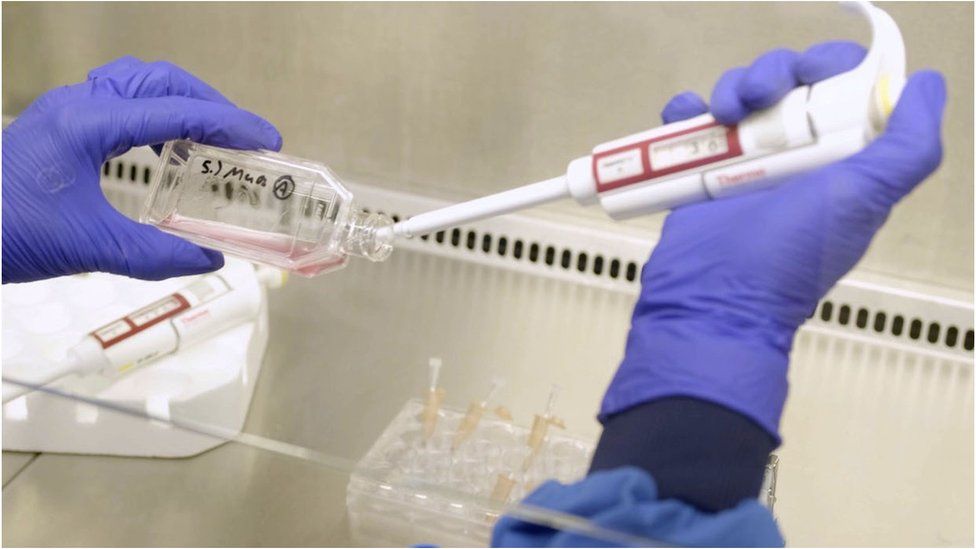image sources, NHSBT
Lab-grown blood stored in a facility in Bristol
According to the British researchers, the blood grown in the laboratory was given to people in a first clinical trial in the world.
Small amounts, equivalent to a few tablespoons, are tested to see how it works inside the body.
Most blood transfusions will still depend on people rolling up their sleeves regularly to donate.
But the ultimate goal is to create viable, yet ultra-rare and difficult-to-obtain blood groups.
These are needed for people who are dependent on regular blood transfusions for conditions such as sickle cell anemia.
If the blood does not match exactly, the body begins to reject it and the treatment fails. This level of tissue correspondence goes beyond the well-known blood groups A, B, AB and O.
Professor Ashley Toye, of the University of Bristol, said that some groups are “really, really rare” and that “there may be only 10 people in the country” able to donate.
At present, there are only three units of the “Bombay” blood group – first identified in India – in stock in the UK.
A lab-grown red blood cell that carries oxygen and carbon dioxide throughout the body
So how is blood grown?
The research project involves teams from Bristol, Cambridge, London and NHS Blood and Transplant. It focuses on the red blood cells that carry oxygen from the lungs to the rest of the body.
Here’s how it works:
The process takes about three weeks, and an initial pool of around half a million stem cells results in 50 billion red blood cells.
These are filtered to obtain about 15 billion red blood cells which are at the right stage of development to be transplanted.
“We want to produce as much blood as possible in the future, so the vision in my head is a room full of machines that continuously produce it from a normal blood donation,” Professor Toye told me.
 image sources, NHSBT
image sources, NHSBTThe first two people took part in the trial, which aims to test the blood of at least 10 healthy volunteers. They will receive two donations of 5-10ml at least four months apart: one of normal blood and one of laboratory-grown blood.
The blood has been labeled with a radioactive substance, often used in medical procedures, so scientists can see how long it lasts in the body.
Hopefully, lab-grown blood is more potent than normal.
Red blood cells normally last around 120 days before needing to be replaced. A typical blood donation contains a mix of young and old red blood cells, while the blood grown in the laboratory is fresh and should therefore last 120 days. Researchers suspect that this could allow for both smaller and less frequent donations in the future.
However, the financial and technological challenges are considerable.
The average blood donation costs the NHS around £ 130. Blood Growth will cost a lot more, although the team won’t say how much.
Another challenge is that harvested stem cells eventually become depleted, which limits the amount of blood grown. More research will be needed to produce the volumes that would be needed clinically.
Dr Farrukh Shah, medical director of transfusions at NHS Blood and Transplant, said, “This cutting-edge research lays the foundation for the production of red blood cells that can be safely used to transfuse people with conditions such as anemia. sickle cell.
“The potential of this work for the benefit of difficult-to-transfuse patients is very significant. “
- Medical research
- sickle cell anemia
- James Gallagher
- Stamina cells
www.bbc.co.uk
The article Laboratory-grown blood given to people in the world’s first clinical trial first appeared on zimo news.
zimonews Fr2En2Fr
Not all news on the site expresses the views of the site, but we broadcast this news automatically and translate it through programmatic technology on the site and not by a human publisher.

